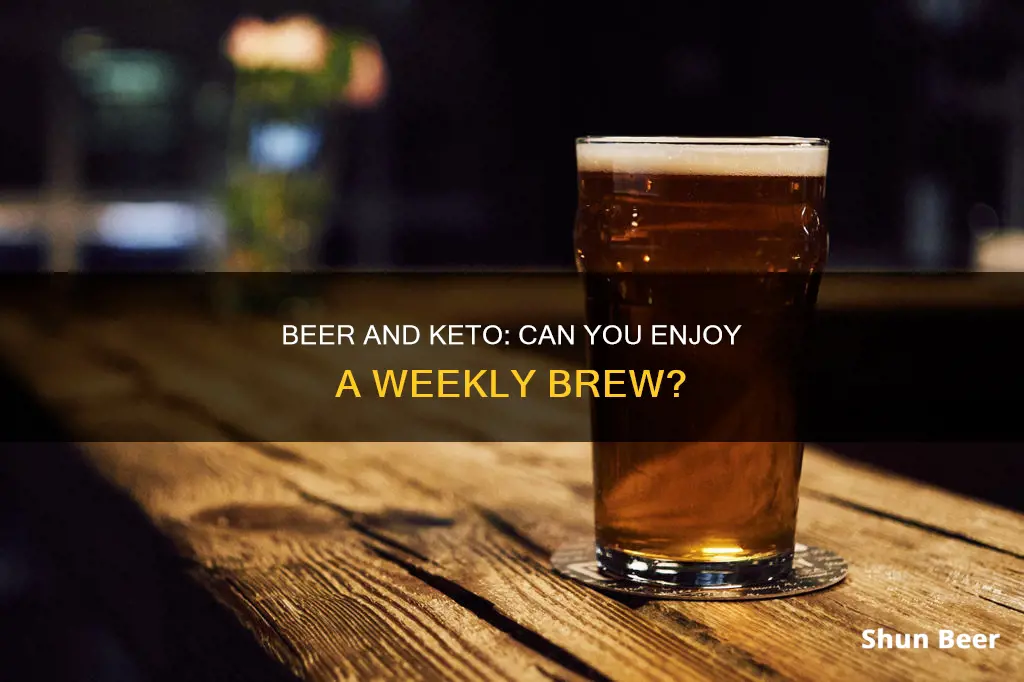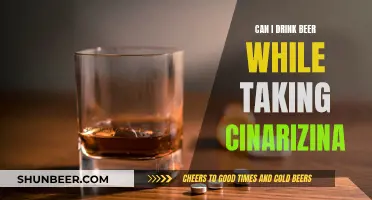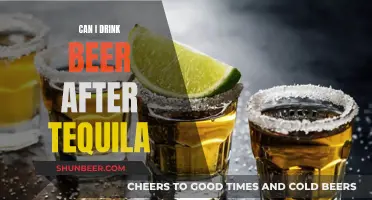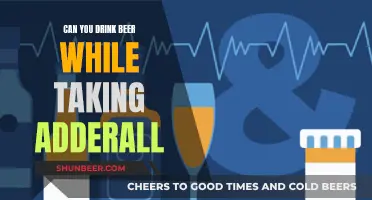
The ketogenic diet is a low-carb, high-fat diet that offers many health benefits. While it doesn't mean giving up your favourite drinks, it does require some adjustments. Alcohol can be consumed on the keto diet, but it is important to make careful choices. Beer is usually made from grains and is therefore not the best choice for those on a keto diet. However, some beers are low in carbs, such as Corona Premier, Miller Lite, Budweiser Select 55, Beck's Premier Light, and Michelob Ultra. These beers can be consumed occasionally and in moderation without damaging your progress. It is also important to be mindful of how much you drink and how often, as alcohol can affect your inhibitions and make you more likely to overeat.
| Characteristics | Values |
|---|---|
| Can I drink beer once a week on keto? | Yes, but it is not recommended. |
| Recommended drinks on keto | Pure spirits (gin, whiskey, vodka, tequila, rum, brandy), light beer, dry wine, low-carb cocktails |
| Non-recommended drinks on keto | Regular beer, sweet wine, cocktails with high-carb mixers (fruit juice, soda) |
| Alcohol's effect on ketosis | Alcohol slows down ketosis. |
| Alcohol's effect on weight loss | Alcohol suppresses fat burning and increases weight gain. |
| Alcohol's effect on health | Alcohol has negative effects on health when consumed in high quantities. |
What You'll Learn

The best and worst keto-friendly alcoholic drinks
The best keto-friendly alcoholic drinks
- Pure spirits — whiskey, brandy, cognac, vodka, gin, and tequila contain zero carbs and are all fine on keto.
- Dry wines — these contain fewer carbs per ounce than sweeter red wines. One glass of cabernet sauvignon has 3.8 grams of total and net carbs, 0 grams of fat, and 0.1 grams of protein.
- Champagne or Prosecco — Champagne has less than 1 gram of carbs per ounce. Go for brut (rather than “extra dry” or “sweet”), which has a lower amount of carbs. A standard 5-ounce glass of a California sparkling wine called Korbel Brut has 2 grams of total and net carbs, 0 grams of fat, and 0 grams of protein.
- Light beer — some light beers do not exceed 7 grams of carbs and can be managed to fit your daily carb allowance. These include Coors Light Lager Beer, Miller 64 Extra Light Lager, and Budweiser Select 55 Premium Light.
- Hard liquor with a low-carb mixer — have 1 ounce of your favorite hard liquor (vodka, tequila, rum, gin, or whiskey) and add a mixer like soda water or a flavored sparkling water for a drink with no calories, sugar, or carbohydrates.
The worst keto-friendly alcoholic drinks
- Beer — most beers are bad for weight control and should be avoided on keto. A can of regular beer (12 fluid ounces) has 13 grams of total and net carbs, 0 grams of fat, and 1.7 grams of protein.
- Tonic water — tonic water contains a lot of sugar. A vodka tonic has 15 grams of total and net carbs (all from added sugar in the tonic water), 0 grams of fat, and 0 grams of protein.
- Regular soda — a 12-ounce can of Coca-Cola contains 39 grams of carbs, and the same goes for net carbs! A rum and Coke made with regular Coke will pack 17.6 grams of carbohydrates, 0 grams of protein, and 0.4 grams of fat.
- Mixed drinks — most mixed drinks are a combination of hard liquor plus sugar, fruit juice, or purees. A margarita has 36 grams of total and net carbs, 0.2 grams of fat, and 0.2 grams of protein.
- Mimosas — yes, it’s made with Champagne or prosecco, but it also has a lot of orange juice, which means a lot of sugar. One mimosa has 11.3 grams of net carbs (11.7 grams of total carbs), 0.3 grams of fat, and less than 1 gram of protein.
Ginger Beer and Keto: Is It Safe to Drink?
You may want to see also

The effects of drinking beer on keto
Drinking beer while on a keto diet is a controversial topic. Beer is usually made from grains, which are rich in starch and sugars, making it a high-carb drink. This means that a typical beer is not keto-friendly and can kick you out of ketosis. However, some light beers are low in carbs and can be consumed in moderation while on a keto diet.
Drinking beer can slow down your rate of ketosis and progress. The objective of the keto diet is for the fatty acids in your body to be converted into ketones. However, alcohol can also be converted into ketones, and since your liver will process it as soon as possible, the alcohol will be converted first, and not the fats.
It is recommended to not drink beer daily. Even if you do drink beer, try to stick to just one drink a day. Even when not in keto, it is medically recommended to drink in moderation. Knowing which foods and drinks are suitable for your body is essential when you are on keto.
Beers to choose
If you want to drink beer while on a keto diet, choose light beers or ales instead of regular beers or lagers. Some examples of low-carb beers are:
- Michelob Ultra
- Bud Light
- Coors Light
- Corona Premier
- Beck's Premier Light
- Skinny Brands Lager
Things to consider when drinking beer on keto
There are a few things to keep in mind when drinking beer on keto to ensure you don't accidentally kick yourself out of ketosis:
- Limit consumption – Overconsumption can be detrimental not only to your diet goals but also to your health. It's best to have not more than a single drink or a maximum of two.
- Avoid sugary mixtures – Watch out for sugary mixtures in your drink. Go for either plain alcohol or add only low-sugar and low-carb mixtures.
- Monitor carb intake – Balance is key when maintaining your diet. A keto diet typically allows less than 50g of carbs a day. If you drink alcohol, reduce other carb intakes for the day or only pick alcohols with zero carbs.
Old Beer, Safe to Drink?
You may want to see also

Alcohol's impact on weight loss
Alcohol can have a significant impact on weight loss, and this is important to consider when thinking about drinking beer once a week while on a keto diet. Alcohol can affect weight loss in several ways, and understanding these effects can help make informed decisions about alcohol consumption.
Firstly, alcohol is often referred to as "empty" calories. This means that alcoholic drinks provide the body with calories but contain very few nutrients. For example, a typical 12-ounce can of beer contains around 155 calories, while a 5-ounce glass of red wine has about 125 calories. These drinks can lead to consuming a few hundred extra calories during a night out, and drinks with mixers like fruit juice or soda contain even more calories.
Secondly, when alcohol is consumed, it is burned by the body as a fuel source before using other sources like glucose from carbohydrates or lipids from fats. This leads to excess glucose and lipids being stored as adipose tissue or fat. Alcohol also affects the liver, which plays a crucial role in metabolising fats, carbohydrates, and proteins. Excess alcohol consumption can lead to alcoholic fatty liver, which can damage the liver and affect how the body metabolises and stores carbohydrates and fats.
Additionally, alcohol can contribute to excess belly fat. Foods and drinks high in simple sugars, including beer, are also high in calories, and these extra calories are stored as fat in the body, often accumulating in the abdominal area. Alcohol also affects judgment and lowers inhibitions, making it harder to resist unhealthy food choices. Research has shown that alcohol can trigger hunger signals in the brain, leading to an increased urge to eat more.
Furthermore, alcohol intake can affect levels of hormones in the body, such as testosterone, which plays a role in metabolic processes like muscle formation and fat-burning capabilities. Low testosterone levels have been linked to a higher risk of metabolic syndrome in men, characterised by high blood sugar levels and a high body mass index. Alcohol can also negatively impact sleep quality, leading to increased periods of wakefulness during sleep cycles. Sleep deprivation can disrupt the balance of hormones related to hunger, satiety, and energy storage.
Moreover, alcohol affects digestion and nutrient uptake by causing stress on the stomach and intestines, leading to decreased digestive secretions and impaired absorption of nutrients. This can affect the metabolism of organs involved in weight management.
Finally, alcohol can slow down the rate of ketosis, which is the goal of the keto diet. Alcohol can be converted into ketones, and when consumed, it is processed by the liver before fatty acids, disrupting the desired outcome of the keto diet.
In conclusion, while it may be possible to drink beer once a week while on a keto diet without completely halting weight loss, it is important to consider the various ways alcohol can impact weight loss. Alcohol provides empty calories, affects hormone levels and sleep quality, impairs digestion, and slows down ketosis. Therefore, it is crucial to consume alcohol mindfully and in moderation, watching the number and type of drinks, to support weight loss efforts effectively.
Root Beer Bangs: Safe for Kids to Drink?
You may want to see also

Alcohol and keto tolerance
The keto diet is a popular weight-loss option that involves limiting carbohydrate intake. This diet can also improve acne, reduce cancer risks, improve heart health, and protect brain function. While on the keto diet, it is important to be mindful of alcohol consumption as it can affect ketosis and weight loss.
Alcohol's Impact on Ketosis
When following the keto diet, it is crucial to monitor your daily carbohydrate intake to maintain ketosis. Alcohol can disrupt ketosis in two ways:
- Mixed drinks with high sugar content can quickly kick you out of ketosis.
- Excessive alcohol consumption can lead to a loss of self-control, resulting in the consumption of extra carbs.
Lower Alcohol Tolerance on Keto
One surprising side effect of the keto diet is a significant decrease in alcohol tolerance. This means that individuals on the keto diet will reach higher levels of intoxication faster and may experience more intense hangovers. There are a few reasons for this:
- The keto diet depletes glycogen stores in the body. Alcohol is then rapidly sent to the liver and converted into acetaldehyde, leading to faster intoxication.
- The keto diet can lower your alcohol tolerance. This means that even if you eat a meal before drinking, you may still experience faster intoxication and more intense hangover symptoms.
Tips for Drinking on the Keto Diet
If you choose to consume alcohol while on the keto diet, here are some tips to keep in mind:
- Avoid drinking on an empty stomach. Consuming alcohol with a meal can help lower blood alcohol concentrations.
- Choose low-carb alcoholic beverages. Opt for hard liquor, dry wines, or spiked seltzer drinks.
- Stay hydrated by alternating between water and alcoholic drinks. Aim for one glass of water per drink.
- Pace yourself and aim for no more than one drink per hour.
- Be mindful of your alcohol tolerance and how your body reacts to alcohol while on the keto diet.
In conclusion, while it is possible to consume alcohol while on the keto diet, it is important to do so in moderation and with caution. The keto diet can lower your alcohol tolerance, leading to faster intoxication and more intense hangovers. Always drink responsibly and be mindful of your body's signals.
Beer and Wisdom Teeth: Safe Drinking Timeline?
You may want to see also

How to get back into ketosis after drinking alcohol
Drinking alcohol can kick you out of ketosis, but there are ways to get back on track. Here are some tips to help you resume ketosis and stay committed to your keto diet:
- Strictly limit your net carb intake: This is crucial to getting back into ketosis. Avoid high-carb foods and drinks, and opt for low-carb or zero-carb options.
- Drink plenty of water: Staying hydrated is essential for overall health and can also help flush out toxins.
- Engage in physical activity: Exercise can help boost your metabolism and promote fat burning, aiding in the resumption of ketosis.
- Consume healthy fats and medium-chain triglycerides (MCTs): Healthy fats such as avocado, nuts, and olive oil can provide your body with the energy it needs while supporting ketone production. MCTs, found in coconut oil and MCT oil, are particularly effective in boosting ketone levels.
- Consider intermittent fasting: Fasting can help deplete blood sugar and glycogen stores, encouraging your body to switch back to burning fat for energy. However, avoid drinking alcohol while fasting, as this can be dangerous.
- Supplement with exogenous ketones: Beta-hydroxybutyrate (BHB) supplements can support ketosis, reduce carb cravings, and enhance ketone production.
- Avoid alcohol for a period of time: Give your body a break from alcohol to allow it to recover and resume ketosis.
- Plan ahead: If you know you'll be drinking, prepare by eating a balanced keto-friendly meal beforehand and choosing low-carb drink options.
- Be mindful of your limits: Know your limits and stick to them. Your alcohol tolerance may be lower on keto, so pace yourself and don't exceed your usual intake.
- Choose your drinks wisely: Opt for low-carb or zero-carb drinks, such as hard liquor (vodka, gin, tequila) with carb-free mixers like soda water or diet tonic water. Avoid sugary cocktails, beer, and sweet wines.
Remember, it typically takes 48 to 72 hours to get back into ketosis after drinking alcohol. During this time, focus on healthy habits, stay disciplined, and avoid high-carb temptations.
Daytona Beach Beer Rules: What You Should Know
You may want to see also
Frequently asked questions
Yes, you can drink beer once a week on keto, but it is generally recommended to opt for low-carb beers. Some examples of low-carb beers include Budweiser Select 55 Premium Light, Miller 64 Extra Light Lager, and Corona Premier.
Other keto-friendly alcoholic drinks include distilled spirits such as gin, whiskey, vodka, and tequila, as well as dry wines. These drinks are low in calories and contain zero carbs and added sugars.
It is important to limit your consumption, avoid sugary mixtures, and monitor your carb intake. Alcohol can slow down the rate of ketosis and affect your weight loss goals. Additionally, drinking alcohol can lower your inhibitions and make you more likely to overeat non-keto foods.







